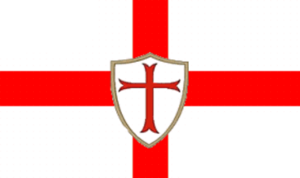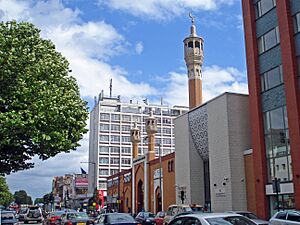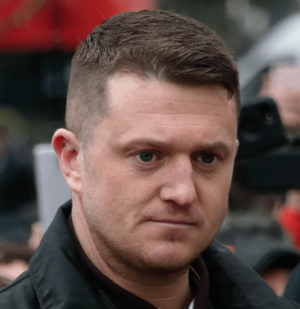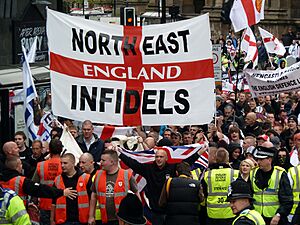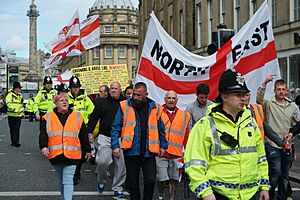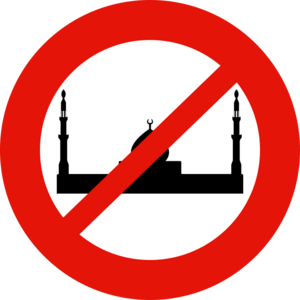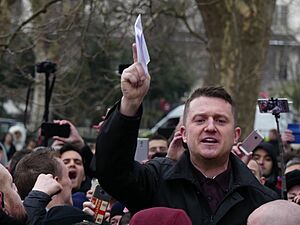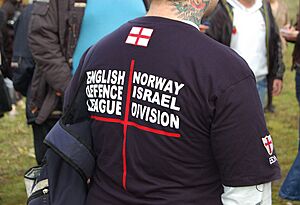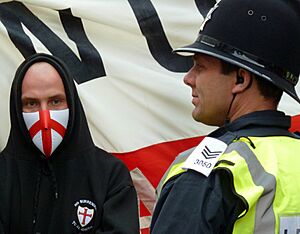English Defence League facts for kids
 |
|
| Abbreviation | EDL |
|---|---|
| Formation | 27 June 2009 |
| Type |
|
| Purpose |
|
| Location |
|
|
Area served
|
England Offshoot groups exist in Australia, Denmark, the Netherlands and Norway |
| Leader | Tim Ablitt |
|
Key people
|
|
The English Defence League (EDL) is a group in England that is considered to be on the far-right of politics. It is also seen as Islamophobic, meaning it has strong negative feelings or prejudice against Islam and Muslims. The EDL is a social movement and a pressure group that mainly uses street demonstrations to share its views.
The EDL says it focuses on one issue: being against Islamism (a political form of Islam) and Islamic extremism. However, its words and actions often target Islam and Muslims more broadly. The group started in 2009 and was most active until 2011, after which its influence began to decrease.
The EDL began in London, growing from groups of football fans who were protesting against a small religious group in Luton, Bedfordshire. Tommy Robinson, who used to be a member of another political party, soon became its main leader. The group quickly grew, holding protests across England. These protests often led to clashes with anti-fascist groups like Unite Against Fascism, who believed the EDL was racist and harmful to British Muslims.
The EDL also became very active on social media, especially Facebook and YouTube. In 2013, Tommy Robinson left the group, saying it had become too extreme. He then started a new, short-lived group called Pegida UK. After Robinson left, the number of EDL members went down a lot, and many local branches started acting independently.
The EDL's ideas are considered extreme-right or far-right in British politics. It is part of a wider international movement called counter-jihad. The EDL believes that Muslims cannot truly be English and sees Islam as a threat that wants to take over Europe. Some experts say this view is a form of cultural racism. Both online and at its events, EDL members have encouraged violence against Muslims. The EDL's main ideas also include nationalism (strong loyalty to one's country), nativism (favoring native-born people over immigrants), and populism (appealing to ordinary people). It blames a decline in English culture on high immigration and politicians who don't care.
The EDL was different from other traditional far-right groups in Britain because it did not support biological racism or antisemitism (hatred of Jewish people). Experts disagree on whether the EDL itself is fascist, but some of its leaders had been involved in fascist groups before, and some neo-Nazis attended EDL events.
At its peak, the EDL had a small leadership team and was divided into over 90 local and special interest groups, each with a lot of freedom. Most of its supporters were young, working-class white British men, some of whom came from existing far-right or football fan groups. Surveys showed that most people in the UK did not support the EDL. Anti-fascist groups often challenged the organization. Many local councils and police forces tried to stop EDL marches because of the high cost of policing them, the disruption they caused to communities, and the negative impact on efforts to prevent terrorism.
Contents
History of the EDL
In the early 2000s, Muslims became the second largest and fastest-growing religious group in Britain. By 2011, about 2.7 million people in England and Wales identified as Muslim. At the same time, some far-right groups in Western countries began to unfairly blame Muslims for problems. In Britain, this happened partly because prejudice against Jewish people and African-Caribbean people became less socially acceptable.
Historically, racist abuse against British Muslims was often based on their ethnic background. However, by the 21st century, British Muslims were increasingly targeted simply because they were Muslim. The British National Party (BNP), another far-right group, tried to gain support by campaigning against Muslims. This campaign grew after the 2001 September 11 attacks in the United States and the 7 July 2005 London bombings. The BNP saw some success in elections but later declined. However, it had already made far-right ideas more common in British politics, which the English Defence League later used to its advantage.
How the EDL Started: 2009
The town of Luton had a history of radical Islamist activity. In March 2009, a small Islamist group protested against a parade for soldiers returning from Afghanistan. This protest, though small, angered many and got media attention.
A former soldier, James Yeomans, planned a counter-protest. However, various "anti-jihadist" groups, including football fan groups, announced they would attend. Fearing his event would be taken over by these groups, Yeomans cancelled it. Instead, Paul "Lionheart" Ray, an anti-Islamist blogger, organized a new march. This led to the formation of the United People of Luton (UPL), which held protests that sometimes resulted in arrests. Another related group was Casuals United, which aimed to unite rival football fans against what it called the "Islamification" of Britain.
The English Defence League officially formed on June 27, 2009. Ray claimed to have founded it, bringing together the UPL and other "anti-jihadist" groups. The EDL's first protest was outside the East London Mosque and was quickly stopped by police. Its first big public event was in August in Birmingham.
Soon after the group formed, Paul Ray left. This allowed Tommy Robinson to become the EDL's main leader. Robinson, whose real name is Stephen Yaxley-Lennon, was a former member of the BNP. He was good at speaking and presenting his views. Joel Busher, a political scientist, described Robinson as "a high-energy, fast-talking, all action character."
Robinson's cousin, Kevin Carroll, also a former BNP member, became his close partner. Another important member was Alan Ayling, a wealthy IT consultant who used the name Alan Lake. Some people believed Lake was the group's main financial supporter.
Growing Stronger: 2010–2013
As the BNP became less popular, the EDL gained more attention. The group presented itself as a necessary response to public frustration about the government not dealing with "extremist Muslim preachers and organisations." It claimed that English culture was being pushed aside, pointing to things like schools only serving halal meat or not celebrating Nativity plays at Christmas.
The EDL mainly organized protests, holding about ten to fifteen per year between 2009 and 2015. These protests attracted hundreds to thousands of people. The group faced criticism from media and anti-fascist groups, who called it racist and far-right. The EDL rejected these labels. Unite Against Fascism was a notable anti-fascist group that organized counter-protests.
The EDL's momentum began to slow down in 2011 due to disagreements between local groups and personal arguments. Some northern groups started calling themselves "the Infidels" and became more separate from the main EDL. There were even fights between supporters of Robinson and other members at rallies.
Robinson also faced legal issues. In 2013, he was sent to prison for ten months for using someone else's passport to try to enter the US illegally. This meant the EDL was without its main leaders for a period.
The EDL's reputation was further damaged when links were revealed to Anders Behring Breivik, a Norwegian far-right extremist who carried out deadly attacks in July 2011. Breivik was connected to the EDL's sister group in Norway and had praised the EDL online. Robinson denied any connection to Breivik and condemned the attacks. However, some EDL members later praised Breivik's actions. In 2011, two EDL supporters were found guilty of planning to attack a mosque.
Building Political Connections
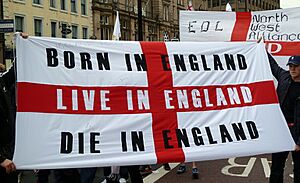
The EDL formed connections with the British Freedom Party (BFP), a group that broke away from the BNP. In 2012, Robinson and Carroll joined the BFP's leadership. Robinson later resigned, saying he wanted to focus on the EDL. The BFP did not do well in elections.
The EDL later connected with another BNP breakaway group, the British Democratic Party (BDP), providing security for one of its events in 2013.
Decline of the EDL: 2013–Present
By early 2013, many believed the EDL was declining. Fewer people attended its events, Robinson was in prison, and it failed to succeed in politics. Other groups that had worked with the EDL, like Casuals United, started to act independently again. New splinter groups formed, some of which adopted more extreme views. Some activists also left the EDL to focus on campaigning for Brexit, Britain's exit from the European Union. The rise of the UK Independence Party (UKIP) may also have contributed to the EDL's decline, as many supporters found it easier to vote for UKIP than attend EDL events.
The EDL saw a brief increase in activity after the killing of British Army soldier Lee Rigby in May 2013. The group's Facebook followers tripled, and it organized several quick protests. At one event, Robinson said that Rigby's killing showed what Islam was.
On October 8, 2013, Robinson and Carroll announced they were leaving the EDL after meeting with the Quilliam think tank. Robinson stated that street protests were "no longer effective" and admitted the dangers of far-right extremism. He said he wanted to fight extremism in a new way. Quilliam provided Robinson with money to help him leave, hoping to weaken the EDL. Robinson's departure angered many members, who felt he was a traitor. The EDL then changed to a new system of leadership, with a committee of regional organizers.
Even though the EDL declined, the feelings that fueled it—especially anger about immigration and Islam—remained common in white working-class communities in Britain. Other far-right groups emerged, often using similar tactics to the EDL. For example, Britain First tried to attract former EDL members and organized "Christian patrols" and "mosque invasions." In 2015, Robinson launched another anti-Islam group called Pegida UK. By 2023, the EDL was largely considered inactive as an organization. However, Prime Minister Rishi Sunak still referred to a group of far-right protesters and football fans as "EDL thugs" during a protest in London.
What the EDL Believes
[D]espite its claims to the contrary, there is much prima face [sic] evidence to place the EDL on the more radical fringes of the political right. This ranges from its populist, nationalist agenda; to its condemnation of leftwing figures on its various blogs and websites; to its strong associations with the US Tea Party movement; to its support for international far right figures, such as Geert Wilders. Moreover[…], key EDL figures, such as Steven Yaxley‐Lennon and Kevin Carroll, have historic links with the British National Party (BNP). Finally[…], extreme right‐wing movements, such as the Aryan Strike Force, have found the EDL a useful host organization.
Experts place the EDL on the far-right of the political spectrum. It shares similarities with other far-right groups that appeared in Europe in the early 2000s. From its beginning, members of older far-right parties like the National Front and the British National Party attended its protests. However, the EDL was different because it tried to include Jewish people, people of color, and LGBT people, whom the far-right had historically discriminated against. Because of this, some historians call it part of a "new far right" that tries to appear more moderate. The EDL is also described as populist because it claims to speak for "ordinary people" against the political leaders it believes control the country.
The EDL says it is "non-political" and welcomes members from all political backgrounds, united against "Islamic extremism." However, its online materials often criticize left-wing people. It's important to remember that far-right groups often present a public image that hides more aggressive private views.
Against Islamism and Islamophobia
EDL members often call Islam an "ideology" or "cult" rather than a "religion," seeing it as a threat to Western culture. They believe there is a clear division between Western culture (which they see as tolerant and modern) and Islamic culture (which they see as intolerant and old-fashioned). The EDL's message clearly separates Muslims from the English national group, suggesting that a Muslim cannot truly be English.
The EDL is part of the international "counter-jihad" movement. This movement is a part of the far-right that is very hostile to migrants, Muslims, and Islam. These groups believe that Islam and Muslims are a major threat to Western countries.
While the EDL says it only opposes "Islamic extremists" and not "ordinary Muslims," its messages often fail to make this clear. Many people who hear the EDL's views may not understand the difference between different interpretations of Islam. Many experts describe the EDL as Islamophobic, a term the EDL rejects. The EDL defines "Islamophobia" differently, saying they don't "fear" Islam but simply see it as a "very serious threat."
The EDL fears that Muslims want to control Britain by enforcing sharia law. They claim this is happening because Muslims have higher birth rates and because new mosques are being built. They see Muslim involvement in politics as an attempt to increase Islamic influence in Britain. The group also claims that British Muslims support Islamic extremism by not speaking out against it.
EDL members often talk about "Islamic supremacism," believing that Muslims feel superior to non-Muslims. They also express anger about the role of men from Muslim backgrounds in grooming gangs that have targeted underage white girls.
Researchers found that many EDL members expressed hatred of Muslims. This hatred was often linked to local issues or personal experiences. For example, some members believed that being treated poorly by an Asian shopkeeper showed that Muslims hate white working-class people. Others were angry about media reports of Muslims burning remembrance poppies. On the EDL's social media, many supporters encouraged violence against Muslims. Chants at rallies included "Die, Muslim, die" and "Give me a gun and I'll shoot the Muzzie scum." The racist slur "paki" was also common at private meetings and demonstrations.
Relationship to Fascism and Neo-Nazism
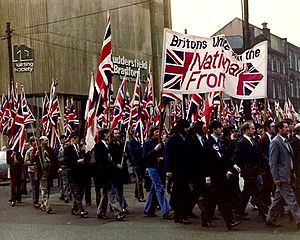
Some experts argue that the EDL is not fascist. They say the EDL does not have the same long-term goals as fascist groups, such as wanting to completely change the British government. However, others argue that the EDL shows many "key characteristics of fascism," including strong nationalism, a tendency for violence, and anti-democratic views among its leaders. They point out that many of the group's leaders came from the fascist BNP, and that members of other fascist groups have supported EDL events.
The EDL is not a neo-Nazi organization. It has tried to distance itself from neo-Nazism, for example, by burning a Nazi flag and flying the Israeli flag at protests. In 2010, Robinson stated, "We're not Nazis, we're not fascists – we will smash Nazis the same way we will smash militant Islam." However, early EDL protests were advertised on white supremacist websites, and some neo-Nazis have attended EDL events. In 2011, the head of the EDL's Jewish Division left the group because of the presence of neo-Nazis. The EDL has tried to ban these individuals from its events, a move supported by many members who want to avoid being linked to neo-Nazism.
How the EDL is Organized
The EDL is a social movement that uses direct action, like street protests. It is a pressure group rather than a political party, and its members often say it is not a political organization. Like other anti-Islam groups, the EDL describes itself as a human rights organization, but this view is not widely accepted by the British public.
Leaders and Local Groups
The EDL has an informal structure without a strict hierarchy or clear leadership. In its early years, a "team" controlled the EDL, including Robinson. Until October 2013, Robinson and Carroll were the main leaders, supported by regional organizers from 19 local groups. After they left, the group was reorganized with a committee of leaders and a rotating chair.
The EDL does not have a central system to control its strategy or beliefs. It works through a loose network of local groups, each largely independent. This flexible structure is popular with members. There are no official membership cards or fees. The EDL used to have at least ninety different groups. These groups often met in pubs and held "meet and greet" events to attract new members.
Some groups were based on location, while others focused on special interests. These included groups for women, Jewish people, Sikh people, Hindu people, and LGBT people. These groups aimed to raise the profile of certain social groups within the EDL and attract members from parts of society that usually avoid far-right groups, such as ethnic minorities and LGBT people. Local groups were organized into nine larger areas. The EDL relied heavily on these local networks and the efforts of local and regional leaders.
Protests and Demonstrations
The EDL's main activity was street protests, which often attracted media attention. These protests came in three types: national protests that brought together activists from across the country, local protests mainly involving the local EDL group, and quick protests held without telling authorities beforehand. Using aggressive street rallies has a long history among the British far-right.
Most people who attended EDL protests were "young, white, working-class males." Few women or people of color attended. EDL members often wore wristbands, t-shirts, and hoodies with the group's logo. Many wore masks or carried flags, such as the English flag of St George or the British Union Jack flag. Israeli and LGBT Pride flags were also often seen.
Local EDL groups often hired buses to travel to national events. These bus journeys were social events where members sang, joked, and told stories, helping to build a sense of unity and community within the EDL.
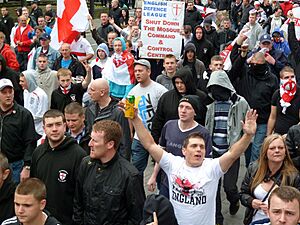
At protests, speeches usually focused on the supposed threat of Islamification, but also mentioned political correctness and the mistakes of the political left. EDL protests were known for continuous chanting with aggressive slogans aimed at Muslims. These chants were anti-Islam, patriotic, or affirmed the EDL's identity. The EDL also used songs, including the UK national anthem "God Save the Queen" and anti-Islam songs.
During protests, the EDL often faced opposition from anti-fascist groups like Unite Against Fascism and sometimes from Islamic groups. Clashes between these groups often led to violence and public disorder, with police trying to keep them apart. Police and local authorities initially allowed most EDL rallies. However, in October 2010, police successfully asked the government to ban an EDL rally in Bradford, fearing violence. By September 2011, over 600 arrests had been made in connection with EDL protests, and policing costs were estimated to be over £10 million.
Focusing on Local Issues
The EDL sometimes organized protests around local tensions between Islamic and non-Muslim communities. For example, after a white woman was assaulted in Leicester in June 2010, the EDL organized a protest, blaming the attack on Islam. When a white man was assaulted in Hyde, the EDL again protested, blaming Muslims, even though police had not confirmed the attackers' religious background. In April 2011, the group protested in Blackburn about hit-and-run incidents involving Muslim drivers, ignoring requests from victims' families not to politicize the events.
In 2011, the EDL launched a national campaign called "No New Mosques." When a mosque was planned in West Bridgford, an EDL organizer placed a pig's head at the site with the slogan "No mosque here EDL Notts." In April 2010, 3000 EDL protesters demonstrated against a new mosque in Dudley. Two months later, EDL members occupied a building at the proposed mosque site, intending to play the Islamic call to prayer loudly to annoy locals. Police quickly removed them.
The EDL knows its protests are expensive for local authorities. For example, policing the 2010 EDL protest in Dudley cost over £1 million. The EDL used this to pressure local councils. In 2010, it sent a letter saying that any local councils that held "Winter-themed" events instead of explicitly Christmas-themed ones could expect a visit from the EDL.
Online Activities
The EDL uses the internet a lot, including an official website and accounts on social media platforms like Facebook and YouTube. By using social media, the EDL tries to avoid mainstream media, which it believes is biased against it. The EDL's leaders managed these social media accounts, blocking critics but not removing posts that encouraged violence against Muslims. Facebook helped the group build excitement before public events. The EDL's Facebook following reached 100,000 before Facebook closed the group's account.
Unlike political parties, the EDL does not produce leaflets or a magazine. The EDL News section of its website published articles and information about upcoming events, which were then shared on social media. The EDL also sold branded merchandise online.
International and Local Connections
The EDL formed connections with similar groups internationally, especially in Europe and the United States. These included parts of the US Tea Party movement and groups like Stop Islamization of America. However, one US leader later distanced herself from the EDL, claiming it had neo-Nazi elements. EDL representatives attended protests in New York City and conferences in Europe.
The EDL also partnered with the Welsh Defence League, Scottish Defence League, and Ulster Defence League, though none were as successful as the EDL. The Scottish Defence League had secret links with the BNP. The Welsh Defence League faced internal divisions and was later shut down after a BBC investigation revealed some members had neo-Nazi beliefs. The EDL also established links with the Danish Defence League and the Norwegian Defence League (NDL). Members of the NDL have traveled to England to participate in EDL protests.
The Australian Defence League (ADL) is an offshoot of the EDL in Australia. It acts as a far-right, anti-Islamic street gang that has made threats and harassed Australian Muslims. The ADL has been involved in many anti-Islamic events in Australia, including protests against mosque construction and bomb threats against Islamic schools. The ADL has also been banned from Facebook.
Who Supports the EDL
It has been hard to know the exact size of the EDL because it doesn't have an official membership system. Researchers believe the number of active members who attended rallies peaked between January and April 2010, with about 2000 people. By 2012, national protests usually attracted only 300 to 700 people. In July 2010, the EDL had 22,000 Facebook followers. After the killing of Lee Rigby in 2013, this number grew to 160,000, and by February 2015, it reached 184,000.
Researchers noted a "high turnover" in the movement, meaning members often joined and left. Many EDL supporters, called "armchair warriors" by the group, did not attend street protests. They feared violence, arrest, or losing their jobs. Involvement with the EDL could also lead to financial costs, losing friends, and police scrutiny. Some members lost friendships and family relationships because of their involvement, while others hid their membership to avoid losing their jobs or having social services take their children.
Who are the Members?
Most EDL members are young, working-class, white men. The EDL brings together three main types of people: football fans, long-time far-right activists, and people who feel left out of society. Experts say that other than their dislike of Islam, there isn't one idea that connects all these different groups, which made the EDL likely to break apart. For most EDL members, joining the group was their first time being actively involved in a political group.
One study found that 74% of EDL members were under 35, and 77% were male. Most described themselves as "White English" or "White British." Only a small percentage had a higher education degree, and many had not finished secondary school. A significant number were unemployed or in part-time jobs, and many lived in social housing. Few members considered themselves Christian. The study also found that while members criticized recent governments, most did not want an authoritarian government or a dictatorship.
Another study of EDL Facebook supporters found that most were male and under thirty. They were also more likely to be unemployed. The most important issue for them was immigration, even more than Islamic extremism. These supporters showed much higher levels of distrust in the government, police, and legal system.
Why People Join the EDL
Some experts suggest that the EDL attracted members by offering "access to violent conflict, increased self-worth and group solidarity." They argue that for many young working-class men who felt their lives lacked meaning, EDL membership allowed them to see themselves as "heroic freedom fighters" saving their nation from Islam. This boosted their self-worth and gave them a sense of belonging and community.
Some sociologists believe the EDL's growth among the white working-class shows a shift from supporting the political left to the far-right. They link this to changes in mainstream British politics since the 1990s. They argue that white working-class people increasingly felt that public policy favored minorities and that they were the only group without strong political representation.
These sociologists also point to economic changes, where traditional working-class jobs were replaced by low-paying service jobs. EDL members felt their parents and grandparents had a better quality of life. According to these experts, the EDL grew from a general "anger and frustration" among the white working class, who felt powerless and forgotten. The EDL offered a simple way to understand their frustrations, blaming Muslims and immigrants for their economic problems and feeling of cultural marginalization.
|
See also
 In Spanish: English Defence League para niños
In Spanish: English Defence League para niños
 | William M. Jackson |
 | Juan E. Gilbert |
 | Neil deGrasse Tyson |


